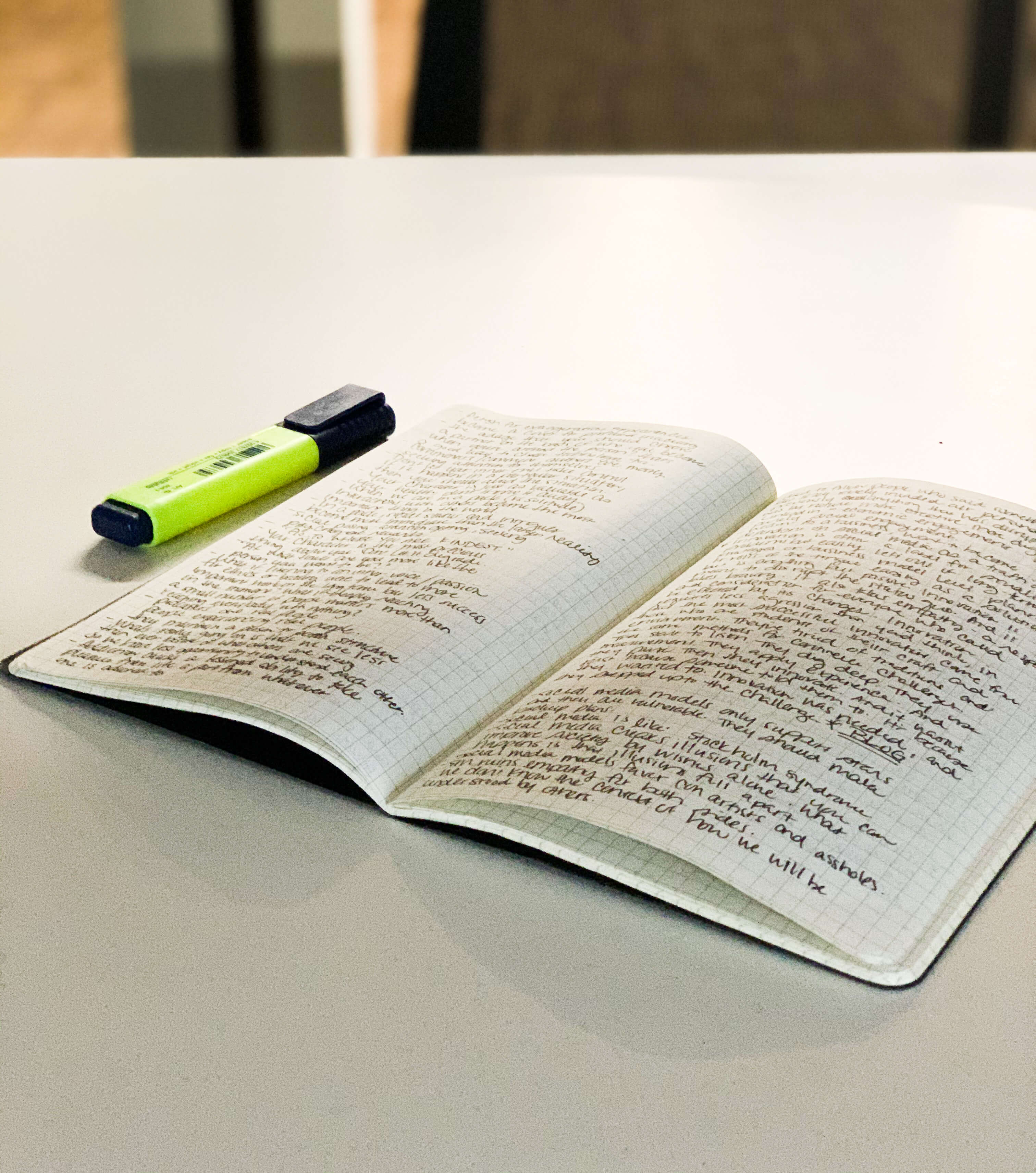I’m not really big on New Year’s resolutions. I should have the resolution to make a change that I think is important at any time of my life or career. But there was a resolution that I didn’t know I needed until I started thinking about a new decade. It has nothing to do with an exercise regimen or purging closets Marie Kondo-style.
It has to do with changing my relationship with a few key words that over time have evoked a negative judgment from me, and that judgment might be holding me back. The ironic part of these three words is that they are key elements and requirements of my job as a global marketing manager: innovation, creativity, ROI.
In the past few years, when I’ve heard these words used, I don’t have a positive reaction. So, I’ve decided to dive into that and find out why and fix it.
Innovation
My judgment: This is a term used when you ask, “What is the most important quality a company should possess?”. You’ll likely hear this word a lot in tech. Innovation. But often, I have found that innovation requires a hell of a lot of buy-in for the change that true innovation might bring.
There it is. Why do I dislike this word? My experience is that it often gets used by people who might be the most stubborn when it comes to change. Innovation is a soft word; it’s fluffy enough to sound friendly in situations where maybe it’s time to be real. True innovation should represent being unafraid, imaginative, opposite, disruptive, thought-provoking, inclusive, represents growth and strengthens the values of an organization or a movement.
However, innovation gets tossed around too easily. Innovation is not passive. It’s not a blanket term. Not everything can be an innovation. If you highlight everything, you highlight nothing. If you try to make everything an innovation, nothing will be an innovation.

Above: My journal where I write and wrestle with ideas like these
How am I refreshing? I met with a few peer mentors of mine and said, “Hey, I’m struggling with innovation. Not the act of it—the word. I hate it. How do you feel about it? Can we talk about that?” Turns out, they love the word. Talking about what it means to them helped me realize that it’s empowering, inspiring and exciting to them. Through the discussion, though, we found out that true innovation is more organic than forced. Maybe innovation cannot be commanded. And maybe I’ve just been hearing it wrong and taking it as a command versus an encouragement. That’s on me to fix that.
“Innovation means you want to disrupt the status quo. But it also takes empathy and a consideration of everyone who could be affected by it.”
Innovation means you want to disrupt the status quo. But it also takes empathy and a consideration of everyone who could be affected by it. Innovation also likely takes less aggression than you think. I believe that most innovative situations come from a place of massive respect that people have for values, principles and the environment they serve. True positive innovators are students of their craft: they listen to others, they dig deep, they are measured in their approach. They apply experience. Their intention is to not be right but to be helpful. They pause. Then … they innovate. They don’t innovate just because someone told them to or because they like the word; they did it because it was needed, and they stepped up to the challenge.
What does innovation really mean to me? Bravery. And that’s something I can always get excited about. If you’re out there and you’re struggling to find a path to innovation, maybe seek bravery instead and see where that takes you.
Creativity
My judgment: Creativity and my contempt for this word is very similar to innovation. So, I may repeat myself here a bit. My background is in art and design, so creativity is at the root of my passions. I have the honor of helping guide our creative brand efforts here at InterWorks. However, something I avoid saying to anyone I work with is, “Try something more creative. Go be creative. Be creative with it!”
The reason I avoid this word directly is because it’s not actually helpful. It’s not enough information to work with. I believe that art is perfected not from absolute freedom (although that can be fun), but it comes from massive understanding. Like “innovation,” creativity is really a term used when someone is wanting to solve a problem. The more you know about the details of the problem and all those affected by and involved in it, the more creative you can be.
In the fine art world, we’ve witnessed a long history of repeating formulas to creativity. The true creators, though, were those who decided to evaluate what existed currently and instigate something new. For instance, impressionism is a response to ultra-realism, as many other artistic techniques are often the antithesis of the present way of doing things. Further, artists like Rothko, Mondrian, Picasso, Van Gogh, Pollock—all creators who are well known now—were once seeing the normative (while highly skilled) artwork of the world and then decided to go in the opposite direction of everyone else. Whether you like their work or not, this is creativity.

Above: Creativity is so much more than its typical conventions. It is artistic bravery.
When someone says, “I want you to be creative,” what they are saying is, “Show me something in a new way. Something I may have not seen before. Something I can’t get to myself. Or something that might be familiar, but do it through a different lens, a different angle, a different approach.”
What does creativity really mean to me? New. And like innovation, creativity requires digging deep. It’s not a carbon copy of something else; it’s a surprise. It’s imagining a different view than what’s already in front of you. The artistic version of innovation. Artistic bravery. Now when I am trying to be creative or asking others to think about creativity, I might ask them to think of ways that might surprise our audiences or help them see/think in a new way instead.
“What does creativity really mean to me? New. And like innovation, creativity requires digging deep. It’s not a carbon copy of something else; it’s a surprise. It’s imagining a different view than what’s already in front of you. The artistic version of innovation. Artistic bravery.”
ROI
My judgment: This word dehumanizes the art of connection. When we take the time to invest in something, we want to verify what we are getting back. We want to know about our return on investment. However, the use of the term “ROI” reduces this theory to a transactional mindset. That’s an easy assumption to make considering we are talking about getting our money’s worth or making sure the effort was worth the result. However, what if we are talking about people?
At InterWorks, although we live in the world of tech, the root of our success is all about people. Our teams, our customers, our partners and our audiences – people. Each of these individuals or groups of people has their own unique story and struggles. Our interactions, our understanding of each other and our understanding of how tech can help us shouldn’t be boiled down to “Did we get our money’s worth?”. It’s a little cold to me.
While using the term ROI means we really do want to measure if an investment is working, I think it might be healthier to reframe this as a “return on relationship” instead. For example, at InterWorks, our consultants are aiming to help our customers solve their tech and data challenges. If we ask them to make sure the customer understands that they will have a high ROI on the solutions we recommend, is that wrong? No. However, our biggest wins come from a mutual rapport between our people and those who work with us in any capacity. Our biggest wins also come when we as an organization work together well and happily. What if, with every initiative, challenge or approach we take on internally or externally, we ask ourselves, “What’s going to be the return on relationship (ROR)?” .
Perhaps we do this by being proactive in reaching out to customers and getting their opinions on how our products/offerings are serving them and asking how we can improve. The ROR is that the customer sees themselves as a part of our roadmap to keep enriching their experience. They know we are listening and want to make sure we keep communication lines open and speak often. The ROR is that we have a mutual understanding with our customers that we’re in this together.
What about whenever we’re working internally with our peers to be innovative and creative, but stakes are high, timelines are tight and roadblocks are keeping us from healthy collaboration? We can ask ourselves, “How can we build a stronger ROR between ourselves for this project to reach its full potential?”. Bringing ROR into the conversation immediately reminds us that other people are involved, and we want everyone to feel like they can have a part in the success of something. Our individual actions will result in a healthy ROR or a poor ROR. A high ROR will likely include things like teamwork, mutual respect, trustworthiness, flexibility, understanding and responsibility.
What does ROI really mean to me? It’s not the combination of fancy business metric words in the dictionary. ROI really means “value;” is what you’re doing providing value? Is it valuable to the people with whom you’re working? Is the solution you recommend to your customer valuable to their work; does it make things better and allow for continued growth opportunity? Is your approach to interpersonal situations valuable? Do others value you and what you bring to the table? Now when I hear ROI, I might understand that there will be a higher return on the investment if everyone involved puts a high value on the relationships we have built among us.

Above: This year, I’m working to embrace change and reframe my thinking.
An Opportunity to Reflect
Looking back on these three words—innovation, creativity and ROI—I am still growing out of the reflex of negative judgments. Bravery, new, valuable: I believe in the strength of this vocabulary to tackle pretty much any challenge that might come my way. Exploring the underlying meanings and alternative definitions has helped me immensely. My advice is this: Don’t be afraid to refresh your perspectives on many things that could be holding you back, even if they might seem like simple vocabulary words. Dig deep and challenge your own understanding.

